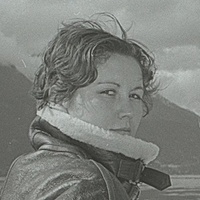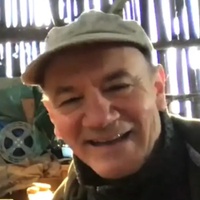On getting outside of yourself
Prelude
Jenny Sadre-Orafai is a poet and essayist and the author of four poetry collections. Her prose has appeared in The Rumpus, Fourteen Hills, The Los Angeles Review, The Collagist, and others. She co-founded and co-edits Josephine Quarterly and teaches creative writing at Kennesaw State University.
Conversation
On getting outside of yourself
Poet and essayist Jenny Sadre-Orafai discusses the importance of listening, valuing pure imagination, and removing ego from your work.
I’m wondering about your background and what your writing journey has been like.
Primarily, I’m a poet, but I’m also an essayist. I teach creative writing at the university level, and I co-founded and co-edit the literary journal, Josephine Quarterly. We’ve been around for 11 years now. I am also a mentor in various organizations. Right now I’m working with Periplus Collective, and that’s really, really important to me—being an active participant in the literary community, aside from my own writing, by championing people and mentoring them.
How do you feel like your relationship with your students and the people you mentor impacts your personal practice?
Writing, for me, is about getting quiet. It’s not about trying to have the answers. It’s just about listening. One of the prompts I give to my students is to eavesdrop on a conversation and use that as a seed. It’s a way of getting outside of ourselves and finding another way in. There’s nothing wrong with sitting down and saying, “Okay, I’m going to write a poem about heartbreak.” But I think that if we start from our own experience, there’s no wonder or realization. That’s what excites me most about poetry that I read—the organic ways ideas unfurl.
Whenever you worked on your recent collection did you come to the narrative organically, or did you start out with one in mind?
When I started, I knew I wanted to explore this lifelong anticipatory grief of losing my parents who are both still alive. So I knew that that would be what the collection was going to revolve around, but I had no idea that there was going to be a narrative arc, because I haven’t done that in any other collection.
What was that experience like? Did you like it?
I did like it. Having a background in writing lyric essays really helped because the collection is mostly fragmented and kind of disconnected, but still, there’s something pulling it all together. It was really exciting to go on this journey with these siblings as they navigate loss and alienation. In a way, I was trying to anticipate how I would do that through them.
That’s really nice. This is your fourth book, correct?
Right.
I’m always so amazed by people who’ve written multiple collections, especially people like you who deal with different genres. What keeps you motivated and inspired to generate work?
It might sound kind of corny, but I think that I still have things to say, or actually, I have things to work out. I’m always curious and turning things over and listening. Because of that, my curiosity is unending. I think that always is going to, or at least so far, has given me things to explore in poetry.
Whenever you feel stuck, what do you do?
I get lost.
Physically?
Yeah, I take a different road home. I get out of town. I get out of what’s familiar, and then everything becomes that much brighter, so it just kind of heightens that attention and that curiosity. That’s my go-to for getting unstuck. Oh and reading, reading, reading. I’m constantly reading. I really like reading outside of poetry because I feel like my weakest spot in writing is my imagination, so I love reading fiction because it’s just pure imagination, and I really love that. It’s completely immersive. Well, good fiction, I guess.
There’s this book by Amina Cain, A Horse at Night. I haven’t finished reading it yet, but she talks a lot about being in conversation. She feels like her the impetus of her writing is her just wanting to converse with her favorite writers or books. Do you view your own writing in the same way, or is it more of what you were saying earlier— a way for you to work things out? Of course, it doesn’t have to be so binary.
That’s a great question. For poetry, no.
Oh, interesting. Say more.
I’m not sure why. I think poetry is so much more organic for me. Do you know what I mean? I’m almost unconscious when I’m writing first drafts. Now with creative nonfiction—I’m working on a book of essays right now—I’m definitely in conversation with other people that I’m reading. For Dear Outsiders, I was definitely influenced by Lydia Millet’s The Children’s Bible and the book/tv show Station Eleven, and then Jenny Offill’s Weather. Things like that, that are kind of a little fragmented and dystopian, or community driven.
I guess out of all the poetry collections, I think that this one may be in conversation with the themes of other works. But I think this collection, even though there’s a narrative, and even though hopefully it seems very personal or intimate, it’s the one that’s most from my imagination.
It makes sense that you were inspired by so much fiction then. Are you interested in writing a novel?
This collection of essays that I’m writing [makes me feel] very uncomfortable because I’m not used to being so transparent. I’m incredibly private. I’ve had thoughts of turning it into a novel, so we’ll see how willing I am.
How do you navigate that feeling of exposure? Does it ever haunt you a little bit?
Absolutely. The first book I think, was incredibly autobiographical. It was about a marriage that dissolved and the experience of giving readings from that book. Even though I mean, I remember getting really frustrated because people would read the book and they would say, “I’m so sorry this happened to you.” And while giving readings from that book, I’d look up and see faces of pity which made me never want to write about myself again. I don’t like the assumption that I’m the speaker.
It’s hard, even for myself sometimes, to remember that poetry isn’t a mirror necessarily. How do you make that distinction for yourself?
Well, I’m really good at dissociation. I’m never grounded or in my body, so my identity is really kind of slippery, to begin with. But I think I’ve just always felt that poetry isn’t fact. There are barriers or guardrails when I’m writing creative non-fiction, right? There’s only so much I can get away with. But I think with poetry, I blur things.
I think we do such a disservice to students in middle school and high school by teaching them to read poems for comprehension. “What symbols do you notice?” “What is the poet saying?” Instead, I ask my students to tell me how the poems make them feel. But even with prompts like that, they’re still like, “I think that this poem is about,” and I’m like, I don’t care what it’s about. That’s not what I’m asking you.
That’s something that keeps a lot of people from poetry because they think that they have to comprehend something. That’s not what it’s about. It’s about mood. From the first line to the last line, were you moved emotionally, even if you hated it, did it alter you in some way? I personally don’t come to poems to glean knowledge.
That’s really interesting. I was listening to this webinar the other day, and someone said that the mistake people make with poetry is that they treat it almost like an oracle, they’re trying to find the truth, the deep wisdom of life. The person argued that poetry just gives us questions to think about. But it’s never or, should never, try to provide answers. What you’re saying made me think of that: the distinction between feeling and fact. Comprehension isn’t always necessary, or the point.
Right. I tell my students to avoid bows, move their egos out of the way, and let the reader have their own experience.
Does it still feel exciting to release new work into the world?
Yeah, absolutely. I mean, I’m not very comfortable with attention or promotion, but to see this thing get to be something that other people read is really nice and very rewarding, and I’m really grateful for it. And the conversations I get to have, that is the best part, giving readings and talking with people about the poems, that’s way more exciting to me than really even the physical book. The connection.
- Name
- Jenny Sadre-Orafai
- Vocation
- poet and essayist
Some Things
Pagination



